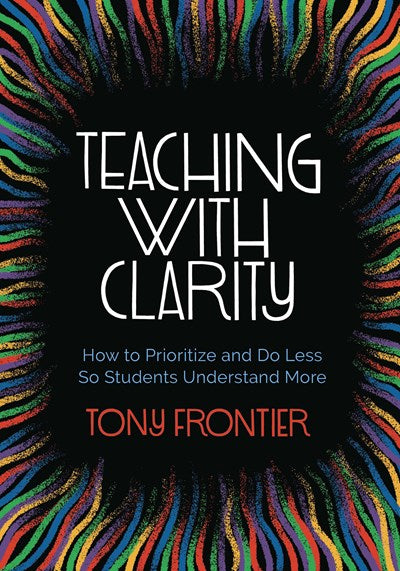Rather than more programs, strategies, assessments, and meetings, teachers need more clarity, which emerges when we prioritize our efforts to do less with greater focus.
Feeling overwhelmed—constantly, on a daily basis—has unfortunately become the status quo among educators. But it doesn't have to be.
Schools need to stop adding more programs, strategies, activities, resources, projects, assessments, and meetings. Though they are often implemented with the best intentions, these things ultimately end up as clutter—that which inhibits our ability to help students learn.
Instead, teachers need more clarity, which emerges when we prioritize our efforts to do less with greater focus. This isn't simply a matter of teachers doing less. Rather, teachers need to be intentional and prioritize their efforts to develop deeper understanding among students.
In Teaching with Clarity, Tony Frontier focuses on three fundamental questions to help reduce curricular and organizational clutter in the interest of clarity and focus:
* What does it mean to understand?
* What is most important to understand?
* How do we prioritize our strategic effort to help students understand what is most important?
By prioritizing clear success criteria, intentional design, meaningful feedback, and a shared purpose, teachers can begin to clear away the curricular clutter that overwhelms the profession—and embrace the clarity that emerges.
Feeling overwhelmed—constantly, on a daily basis—has unfortunately become the status quo among educators. But it doesn't have to be.
Schools need to stop adding more programs, strategies, activities, resources, projects, assessments, and meetings. Though they are often implemented with the best intentions, these things ultimately end up as clutter—that which inhibits our ability to help students learn.
Instead, teachers need more clarity, which emerges when we prioritize our efforts to do less with greater focus. This isn't simply a matter of teachers doing less. Rather, teachers need to be intentional and prioritize their efforts to develop deeper understanding among students.
In Teaching with Clarity, Tony Frontier focuses on three fundamental questions to help reduce curricular and organizational clutter in the interest of clarity and focus:
* What does it mean to understand?
* What is most important to understand?
* How do we prioritize our strategic effort to help students understand what is most important?
By prioritizing clear success criteria, intentional design, meaningful feedback, and a shared purpose, teachers can begin to clear away the curricular clutter that overwhelms the profession—and embrace the clarity that emerges.

